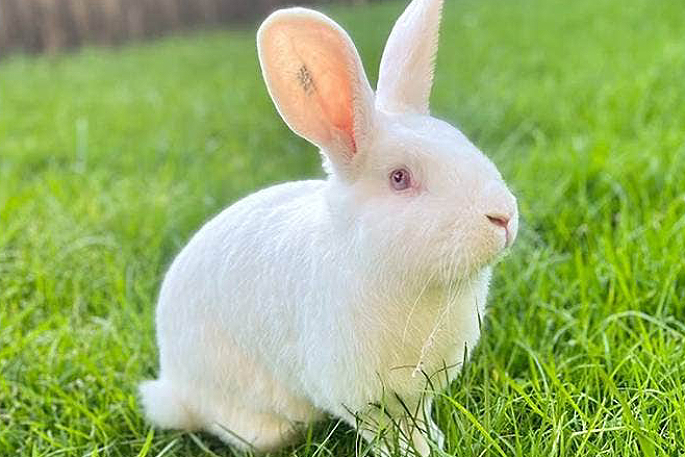Thousands of rabbits are used for science every year, most not making it out alive – in an “incredibly rare” opportunity, Auckland University is looking to rehome seven rabbits with the help of the New Zealand Anti-Vivisection Society.
From 2019 to 2021 almost half a million animals were bred for science, never used, and killed.
In 2021, 56,187 bunnies were used for research, testing and teaching purposes in New Zealand. Only 95 of them were saved.
Working closely with Dr Jodi Salinksy the animal welfare officer at Auckland University, NZAVS has helped rehome hundreds of animals including rats, rabbits, zebra finches, pigeons and sheep.
Executive director for NZAVS Tara Jackson says they are collaborating with the Raining Rabbits Rescue team in Auckland to find Ned, Bumble, Mango, ChiChi, Bulma, Simon and Alvin the best possible homes in the Auckland region.
“This is by far the most rabbits we have been able to get out at once... We call this a rare opportunity because most rabbits who are used for science in Aotearoa don’t make it out alive.
“In fact, the percentage of rabbits who died or were killed after being used for science in NZ hasn’t been below 85% in the last decade.”
Ned, Bumble, Mango, ChiChi, Bulma, Simon and Alvin have very high expectations for their forever home and a strict list of requirements need to be ticked off before you can adopt any of them.
“It’s not a Christmas present, it’s not a temporary fun thing. It’s a real animal that will be with you for the duration of its life. You’re adopting them into your whānau.
“You need to be committed to caring for the animal, providing vet care, which does cost, so you have to be aware of the financial commitment. We do ideally look at people who have had rabbits before.”
Ned
Ned is a two-year-old male who was used as a training rabbit. He’s described as ‘picky’ with humans, but once you’ve gained his trust he will stay for pats and scratches forever.
Currently, Ned is a house renovator extraordinaire, rearranging his home to meet his needs.
“His latest creation is making a two-entranced house out of a one-entranced house by balancing it on the edge of the floor pen and digging a tunnel.”
Bumble
Bumble is described as a very shy but friendly bunny when she trusts you. She’s two years old and was used for breeding.
Mango
A bit more wary, Mango is extremely shy and struggles to gain trust. She’s a two-year-old that was used for breeding.
“Also, a DIY house renovator with very similar tastes to Ned. Maybe a match made in bunny heaven?”
ChiChi and Bulma
Planned to be rehomed together, sisters Chichi and Bulma were born on February 14, 2022. Both bunnies were bred to be used for an experiment that never happened.
“They are sisters who love each other very much! They are usually huddled up with each other and grooming each other.”
Simon
Simon is almost seven months old and was bred to be used for research that didn’t happen.
Alvin
Simon’s brother Alvin is also almost seven months old and was bred for research that didn’t happen either.
Although the two are brothers, they “aren’t bonded” and won’t be rehomed together.
Currently no regulations are in place that requires New Zealand institutes using animals for science to rehome them where and when possible.
“At NZAVS, we focus on rehoming the animals that we can by working collaboratively with institutes like the University of Auckland,” says Jackson.
Until the rabbits are adopted, they’re well looked after at the university and will remain there until they find their suitable owner.
”They are in their pens but they get out and explore and chat with each other. They move their body to where they want to be scratched, get given treats and plenty of visitors,” says Salinksy.
Visit NZAVS to find out more about the rabbits and how to adopt them.



0 comments
Leave a Comment
You must be logged in to make a comment.